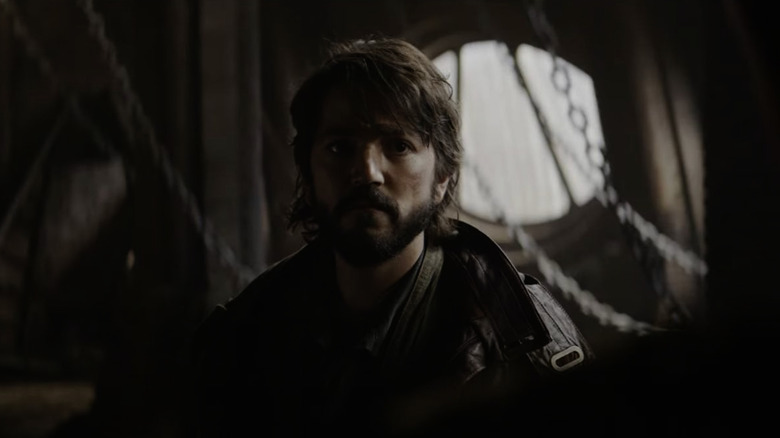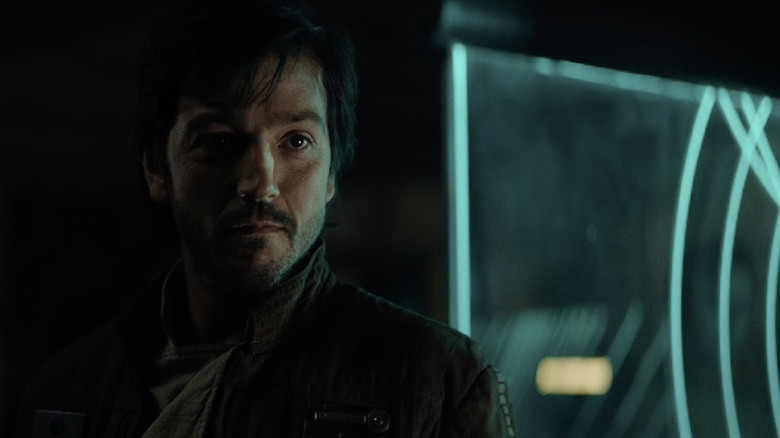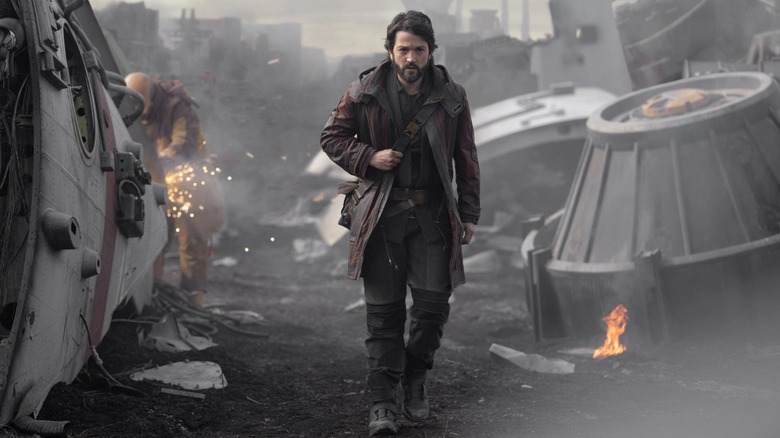Andor Will Lend Some Clarity To One Line From Rogue One
The first three episodes of "Andor" premiere on Disney+ this week, and it's shaping up to be one of the more exciting offerings of all the "Star Wars" series so far. As a direct spin-off of "Rogue One: A Star Wars Story," the story is excitingly zoomed in on a part of canon that has only been slightly colored. It will delve into the humble beginnings of the Rebel Alliance, right at the point where the Jedi religion and the Force has become mythical. A spark of rebellion amongst the common people is igniting to stand up against the Galactic Empire.
Its titular character, Cassian Andor (reprised by the beloved Diego Luna), is particularly one character we'd thought we'd seen the last of. He's first introduced in "Rogue One," blasting an injured man after receiving important Empire intel from him — an immediately compelling moment of moral ambiguity. As he grows closer to his brothers in arms, particularly the scrappy Jyn Erso (Felicity Jones), he opens up about his past, "I've been in this fight since I was six years old. You're not the only one who lost everything. Some of us just decided to do something about it."
In an interview with TV Line, Luna revealed that "Andor" will fully explore and add context to what was otherwise a throwaway line, as the show will flash back into the most formative moments in Cassian's childhood.
Cassian Andor's childhood will be shown onscreen
Luna elaborates that showrunner Tony Gilroy, who also co-wrote the screenplay to "Rogue One," had all the answers to what was once a hint of a character's larger backstory:
"What does it mean to start a fight when you're six years old? What makes you miss your childhood that way, that you are part of a movement already? We're going to see what that line meant, and I was just shocked when I read what Tony [Gilroy] was proposing — which happens to me often with the writing of Tony Gilroy. It's so complex and unique, but it's so juicy also."
It's exciting that the person who created Cassian has been given the opportunity to revisit this character. In "Rogue One," there's something quite haunted about him. He's hardened and battle torn, quick to judge and slow to trust those not immediately allied with him. Evidently, when a Rebel officer orders him to kill Galen Erso at first opportunity, there's an implication that he has plenty of blood on his hands. When he references the sacrifices he's made in his life, he also means the moral compromises he has had to make for the rebellion's survival, and by extension, his own survival.
Cassian's backstory could add layers of moral ambiguity to Star Wars
The promise of "Andor" fulfilling exactly what Cassian has done and gone through for the Rebel cause is exciting, because in order to show us the emotionally scarred man we see in "Rogue One," this show needs to delve into who he was at his most pure and vulnerable. What makes a full character study of Cassian so compelling is that promise of ambiguity in a franchise so previously defined by its hard lines of good versus evil. Luna seems to agree, as he continued, "Cassian's backstory is intense. It's powerful, it's emotional, and I think audiences are going to see him differently after understanding what happened in his childhood."
The world of "Star Wars" is no stranger to tragedy. Most of the protagonists in this universe were orphaned children, some even enslaved, longing for a richer and more adventurous existence. From Luke, to Rey, to Mando, a core theme of "Star Wars" is about overcoming that longing and finding purpose in life. It will be interesting to see how "Andor" fits that theme through the lens of a character who simply had no choice but to make hard choices for his survival, and any shade of complexity it adds to this universe is a welcome addition.


